#my classes are in european spanish!!
Text



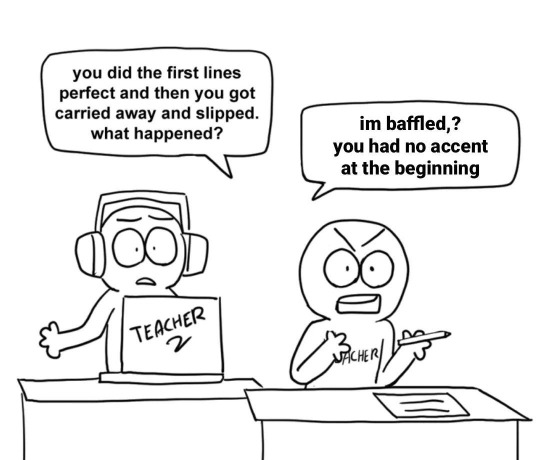

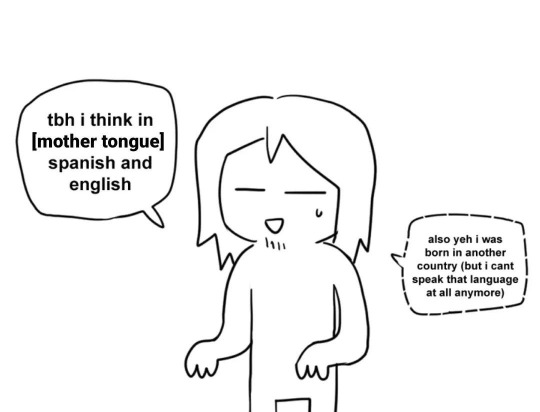
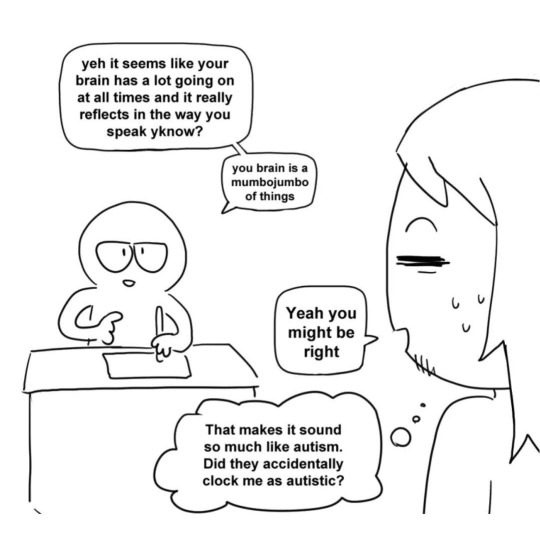
I started taking voice/dubbing acting classes and I'm finding joy in making little comics relating the experiences
#comic journal#autobio comics#VA training#my classes are in european spanish!!#im doing the comics in english for my general audience#btw I am taking a break from art unless paid#or these comics cuz theyre relaxing and easy to make#it's funny my neurodivergency was more evident than me being trans
96 notes
·
View notes
Text
i need to get over myself and learn the languages i want to learn if i want to learn them like i just need to do it if i want to learn them then i should go out and learn them and like . fuck whatever else any of it means . yes it IS embarrassing to learn a language like the ones i want to learn as an adult but who CARES and yes i KNOW my grandparents will never want to speak to me in those languages but who CARES if it's important to me it can be important to me anyway
#had a moment last night bc i was apparently having an identity crisis which was random#but i had a moment where i was like well even if i learn all these languages no one in my family is going to want to speak to me#in those languages because of [insert reasons i don't need to go into here] and so ultimately none of this is like . cultural Really#it's just me wanting to feel as though i am connected to something when i will never be#and maybe that's true or maybe it isn't but if i want to learn them i should learn them anyway like . at the end of the day#i DO want to learn those languages and i think it would be interesting and i would love to be able to speak to people#in those languages even if the people i speak to aren't related to me and i would love to be able to speak languages that aren't english#and that all stays true even if i am not able to have the cultural connection through language with my own family#like i can go on and on about how disconnected i feel from my culture bc of everything that has ever happened in my life#but how i still feel alienated bc i'm Not White to white people and all of that is true but not learning a language doesn't make it#any better and maybe learning a language won't make it better either but i think it's a better use of my time#ALSO !!!!! NO ONE EVER GOES OH WHY WLD U LEARN FRENCH OR SPANISH [OR INSERT EUROPEAN LANG HERE] u have no real cultural connection to it!!!#so like why is it different bc i want to learn asian languages??? it's not! except in my head! or maybe irl too but i'm just saying#that i think i make all of this a much bigger deal than it has to be#that being said i did just try to look up classes and they r all for children and about keeping children culturally connected 2 their famil#l m f a o but that can't be ALL the classes ............. i'll work it out is what i'm saying and i need 2 get OVER myself#bc none of it is that deep and i can feel conflicted all i like but i should fucking DO smth about it at least#anyway i am posting this in the hopes that i can beat it into my own head bc i am sick and tired of being weird about learning#languages and i need 2 get over my weird cultural identity issues if i want to like . live a life where i don't want to explode and die
11 notes
·
View notes
Note
Hi opencommunion - you are one of my favourite Tumblrs and I love hearing about Lebanese history from you. You say you are antiPhoenicianist - I hope you would tell us more about it. Hope you're having a great day.
aww thanks, I love your blog too <3
Phoenicianism is a Lebanese ethnonationalist ideology that basically argues that Lebanese people are ethnically/culturally unrelated to (and, implicitly or explicitly, superior to) not only other Arabs but other Levantine peoples. It's a secular ideology but it's extremely Islamophobic, so it posits that Lebanese Christians (especially Maronites) are the "purest" Lebanese people with a direct line of descent from the Phoenicians, who are portrayed as an almost supernaturally heroic and advanced culture who were supplanted by savage Arabs from the south (you probably recognize this as a Zionist talking point; more on that later). It's a narrative of Lebanese history that originates from rich European-educated Lebanese and their French & English orientalist buddies, and it bears all the hallmarks of European ethnonationalism and scientific racism. In my experience ascribing to Phoenicianism is associated with class and it doesn't represent the majority of Lebanese Maronites, who do consider ourselves Arabs. My family are dyed-in-the-wool Maronites from Wadi Qadisha, the cradle of Maronite culture, and for as far back as our family histories go we've always described ourselves as Arabs, with religion being the only difference—and an unimportant difference—between us and our Druze and Muslim neighbors.
Phoenicianism predates the Zionist occupation but it started to take shape around the same time as Zionism, and is based in the same core orientalist myth: that the ancient Levant was populated by strictly separate and homogenous ethnocultures with exclusive claim over portions of the land, which were later supplanted by Arab Muslim invaders who oppressed a tiny remaining local population. (In reality, of course, SWANA cultures have always been internally diverse and mutually influential, and "Arabization" in the Levant was characterized by organic cultural shifts among local populations, with Arab culture influencing and combining with local cultures rather than replacing them).
So when the Zionist settler project arrived they found easy allies in Phoenicianism. This relationship eventually culminated with the settler state backing the fascist Lebanese Phalanges Party (Kataeb in Arabic, a direct translation of Falange, the Spanish fascist party that inspired its founders) in the Lebanese Civil War. Israel used the Phalanges as a proxy to fight the Palestinian resistance in Lebanon, and it was Phalangists who collaborated with IOF to carry out the Sabra and Shatila massacres. This is the cruelest and ugliest moment in Lebanon's history and Phoenicianism enabled it; Phoenicianism enabled the cognitive dissonance necessary for Lebanese to participate in the occupation's genocide against our siblings and act as footsoldiers for the European fascist agenda in our region. The Phalangists and Zionists lost the war but there is still a Phalangist presence in the Lebanese government, and Phoenicianism is unfortunately alive and well among the Lebanese right wing at home and in the diaspora
381 notes
·
View notes
Note
love love love these social media aus. i am obsessed. would love to see a soft launch with carlos maybe of him showing her spain and his home? carlos just screams old money european vibes and i love it
old money | carlos sainz social media au
pairing: carlos sainz x reader
a class in soft launching 101
carlossainz55



liked by landonorris, charles_leclerc and 301,671 others
carlossainz55: some much needed time at home
view all comments
username WHOMST?
landonorris so i see my invite was lost in the mail?
carlossainz55 i thought you were tired of third-wheeling?
landonorris touche
username was deluding myself that it was maybe his sister but the third-wheeling comment just slapped me in the face
charles_leclerc ahhhh my favourite sainz
carlossainz55 thanks mate you're my favourite leclerc too
charles_leclerc i meant the dog mate
arthurleclerc that's not what you said to me at imola sainz
yourusername

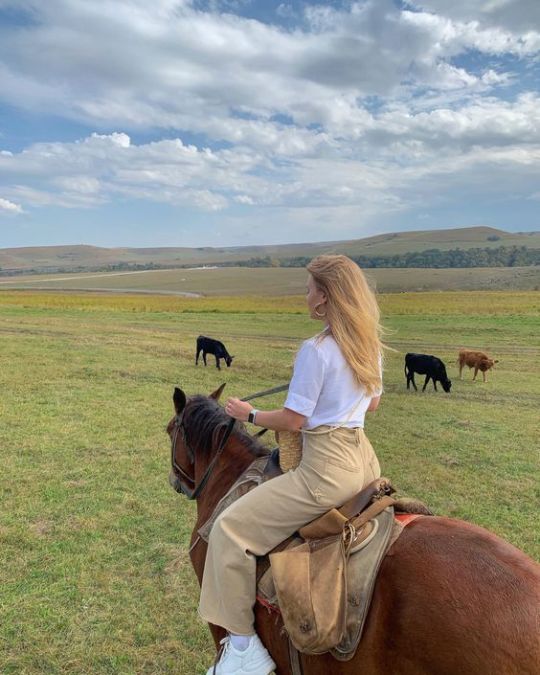
liked by carlossainzz5, yourbff1 and 21,761 others
yourusername: let's go explorin'
view all comments
username i'd eat her last when we eat the rich
username what i'd do to be her friend? assistant at least?
username i saw her in madrid the other day and omg she's even more graceful in person
username her posture is insane i need it bad
username while she looks great and you're all right - are we ignoring that a MAN is driving the car?
username i am ignoring it because i don't want to think about it
username she can't be the coolest person in the world and be in a relationship it's not fair

carlossainz55


liked by yourusername, landonorris and 359,561 others
carlossainz55: blood is thicker than water
view all comments
username my favourite pastime is watching the old money aesthetic overtake carlos' entire being as soon as he sets foot back in spain
landonorris oh he's getting braver
carlossainz55 you gonna be bitter under all my posts cabron?
landonorris until i'm wifed again, yes.
username so like why is y/n here?
username is that defo her?
username i was referring to her liking the post but now you say it, the girl on the horse does look suspiciously similar
charles_leclerc mommas boy
carlossainz55 didn't know it was a crime to love my mum
username so yall be yelling about y/n but not telling us who she is and why she matters
username y/n y/ln is a spanish socialite whose family own a lot of the high end restaurants in madrid but she's most known for her poetry and style
username so do we hate or love her?
username i like her, and a lot of people do, just usual dislike for being grossly rich but from what i've seen she's pretty down to earth

yourusername
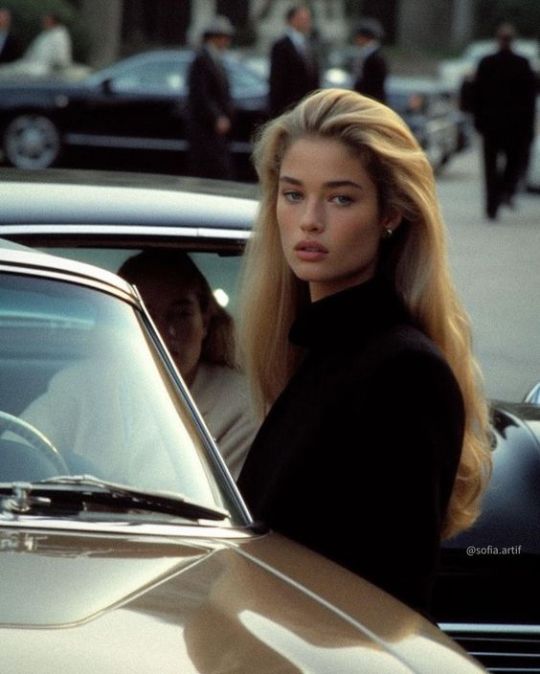

liked by carlossainz55, charles_leclerc and 29,871 others
yourusername: keeping the operation smooth
view all comments
username THIS ISN'T FUNNY
username stop playing with us please
username i feel like this is all the confirmation we'll get
username y'all i know he's an f1 driver and everything but we all know he's PUNCHING
username i need her haircare routine STAT
f1wagsupdates


liked by username, username and 1,249 others
f1wagsupdates: it's all but confirmed!! after a pretty solid soft launch from both carlos and his new lover y/n y/ln, her latest post was captioned "keeping the operation smooth", playing on carlos' iconic theme song. our sources state that the driver and socialite poet have been together for as long as six months but after other relationships and relative platforms, both were determined to take it slow. what do you think?
view all comments
username they're very cute and i can't wait to see her paddock looks
username bestie i fear you'll be waiting a while she's notoriously private when it comes to event appearances - really only going out for her family or her own events
username they're annoyingly sexy like save some for the rest of us
username this soft launch feels like its been going for about seven years
username f1 drivers defo have a type
carlossainz55
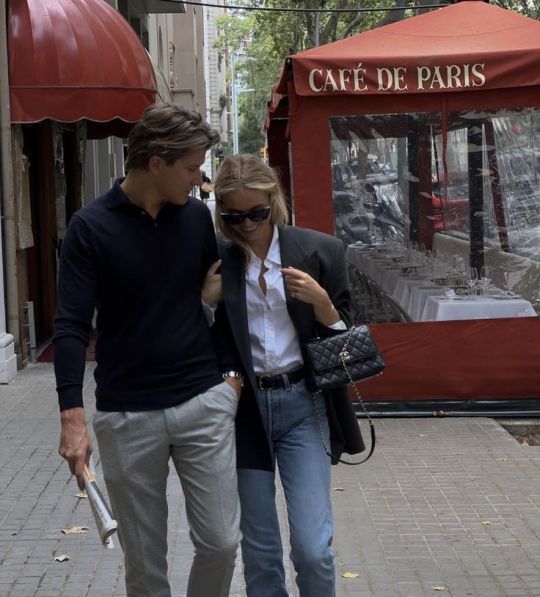

liked by landonorris, yourusername and 720,778 others
tagged: yourusername
carlossainz55: mi hermosa
view all comments
username AHHHHHHHHHHHHHHHHHHH
yourusername you live in my heart
carlossainz55 and i never want to leave
landonorris free real estate
yourusername my favourite third-wheel
carlossainz55 stay out of grown people's business landito
username they're so lana del ray coded
yourusername


liked by scuderiaferrari, carlossainz55 and 71,230 others
tagged: carlossainz55
yourusername: life with you feels like poetry in motion
view all comments
username NOOOOOOO WE LOST HER
username but does this mean new poetry ??
carlossainz55 you make me crazy baby
yourusername crazy in love
username when will it happen to me?
landonorris finally i can interact without having a year long argument with carlos
lando.jpeg



liked by carlossainz55, yourusername and 301,285 others
lando.jpeg: a study in third wheeling, a six month project by yours truly
view all comments
username i'm obsessed with this couple actually
carlossainz55 as much as you are annoying landito, thank you for these ❤️
yourusername we love you landito
landonorris so i can use the boat
yourusername i don't love anyone that much
carlossainz55 eh?
yourusername other than you obviously
username lando just starts domestics in these comments and i love that for him
note: sorry this one is a bit short, but i hope you enjoyed anyway!!
#f1#f1 x you#f1 instagram au#f1 x reader#f1 imagine#carlos sainz x reader#carlos sainz imagine#carlos sainz f1#carlos sainz x you#carlos sainz instagram edit
2K notes
·
View notes
Text
I think one interesting thing about Wakanda Forever is that people will have different opinions about Namor depending on where they're coming from.
Namor isn't looking for revenge, despite everything he's been through and all the horrors he has witnessed. Namor's main goal was protecting his people today. His main goal was making sure other countries wouldn't find his location and do what they usually do. It wasn't about revenge. If those countries had never made any moves to attacked Nations with vibranium, Namor would have stay in his little World without bothering anyone. They only come to the surface when they are in danger
He saw what the Spanish and all the other Empires were capable of, and knows that they would still do the same today, given the opportunity.
And I think that when people see Namor, they also think that he's trying to get revenge for what happened to him and his people centuries ago, and fail to realize that he's trying to protect his people not because of what happened in the past, but because of what is still happening. Because in a lot of people's mind colonization is a thing of the past.
I'm saying this because I'm French, but what if I told you that a lot of School History classes there's a chapter dedicated to "the benefits of colonialism". Can you just imagine how disgusting and violent that is? But it's something that is part of the mentality of a lot of French people, and not a major concern.
People died, were mutilated, but to this day there are some classes were teachers are teaching about "benefits" of a crime against humanity.
This is violent to any French students who are originally from an African country, specifally countries that were colonized by France but not only.
Also, one thing that strikes me is when people talk about colonialism as something that was done to "our ancesters" but if I can give the example of African countries a lot of them got their indépendance in the 60s....So people need to realize that we aren't talking about "ancestors" as if it was a long time ago, we're talking about our parents and grandparents.
People think that colonialism is a thing of the past and not something that's still active, so they fail to see its consequences even today. So I guess maybe that's why people think Namor is "overreacting" and not protecting his people.
A lot of Americans (maybe even White Europeans) will think Namor is the Villain because he's fighting the Wakandans, and they're used to the old good guys/Bad Guys trope.
But when I went to twitter to check reactions on the movie, a lot of people, especially West Africans were siding with Namor. Which I found really interesting.
Even to me, Wakanda Forever wasn't a good guys vs bad guys story but a good guys vs good guys story who were fighting each other and then came to a mutual understanding and possible alliance.
I've seen the movie several times already and I still have trouble understanding people who call Namor a villain because there isn't anything in the movie that showed me he was one...
There were Bad Guys and Villains in the movie ...but it was the French and American gouvernement. Not Namor.
My theory is that depending on where you come from you'll look at Namor differently.
I think that when push comes to shove a lot of African people, especially the youth will identity with the people who have known colonialism (Talokan) first, and with the people who have never known it (Wakanda) second.
All the accusations he had against the surface World were justified, first we see the French gouvernement trying to attack a Wakandan outreah center. And then we see that the US gouvernement is planning to attack Wakanda, to destabalize them.
Does anyone have thoughts on this?
423 notes
·
View notes
Text
So the f*cking French Senate is discussing that Andalusia has decided to get rid off of French classes from publich schools
Why this is a French question d'état escapes my understanding.
The audacity of stating: "If multilingualism is not encouraged from an early age in public education, opportunities will be reduced, affecting the solid construction of a multicultural and multilingual European society." But fuck regional languages, they're not included.
"This situation leaves the teaching of French at the discretion of educational establishments and dependent on a minimum number of interested students." As it should in like... a country that is not France??? WTF, I can't believe this is real.
"Consequently and with the aim of overcoming a possible educational crisis, he requests that a mission be carried out in order to evaluate the application of all the European Union agreements signed in 2002, as well as the successive Franco- Spanish." These delusional people are really ready to bring this to the EU, my god, French nationalism is on another level 💀.
46 notes
·
View notes
Text
Studying Language
Sorry I've been rather inactive, I'm slowly trying to get back into the swing of things!
This is something I’m actually qualified to talk about! I speak three languages fluently, albeit in need of a little practise, and I’m learning one more currently, with one on pause due to time constraints. Nevertheless, I feel pretty confident in my information lol. I’m also a qualified TEFL teacher and have worked abroad teaching English!
Full immersion is the best option. The best thing you can do is spend your time in a country that speaks your target language and force yourself to learn, once you have the “Hello,” “Goodbye,” “Where is the bathroom?” all mastered. In Ireland, there are places called Gaeltachtanna where you go for different lengths of time depending on the course and live in a town speaking exclusively Irish, usually staying with an Irish-speaking family, and going to classes for the language and for games and dances. Of course, that’s not an accesible option for everyone, so you could try going to places like your nearest Asian market, Eastern European market etc, and any areas in your city with a lot of immigrants that might speak your target language. If you have friends who speak that language, natively or just to a better level than you, ask to meet them for coffee and chat as much as you can in your language.
Immersion Part Two: Culture. The people who speak your target language natively do so not just becaus that’s the place in which they exist, but because that’s the place that they live- they get their groceries there, they go to school there, and their language developed because of the day-to-day, as well as unique aspects of their culture such as dances, music, and especially food. Learn about the culture of the country or countries that speak your target language. Eg, fold a paper crane or eat sushi if your language of choice is Japanese, watch an telenovela or go to a salsa class if your goal is to learn Spanish.
Watch TV shows in your Target Language. If you can’t access the locations, and even if you can, watching TV or movies is great because it’ll help you understand the cadences of natural speech that you can’t get from a textbook or formal class situation. Start with movies you might be familiar with like Disney movies (I will die on the hill of “Mother knows Best” from Tangled is better in Spanish). You can also combine your subtitles and audio, using subtitles in your own language at first, and challenge yourself to changing the subtitle.
Similar to the above points, use YouTube or Twitch to your advantage too. That’s probably a lot easier if your target language is English, but there are creators that speak in their non-English native language too. My friend watches a Mexican Minecraft YouTuber called Quackity who has a Minecraft server modded to feature a live translator between Spanish and English, which is very cool.
Read books in your Target Language. We don’t love The Chronicles of the Boy Wizard in this house, but the books are available in 85 languages. The Hobbit also has a tonne including Cornish, Thai, and Ukranian, and Twilight has about 37 translations, just to list a few well-known examples. Learn especially about books written originally in your target language.
Consume Media Originally from the Country or Countries that Speak that Language. Read the Witcher, watch Física o Química, join the dubbed vs subbed anime bloodbath. It can be so beneficial to your understanding of a language to see how those who speak it write it themselves, not just for localisation purposes. It can especially be useful for slang and dialects.
Duolingo and other apps. I’m swiftly approaching my 365 day duolingo streak,* and I fully intend to celebrate with pierogis and a green cake. But there are other options out there, and all of them are great for beginners. I can only speak about Duolingo as its the one I use, but I’m having a lot of fun with the layout of it. However, I do need real practice if I’m going to become actually fluent.
That’s it! I hope this has been helpful!
*I've surpassed it since writing this!! I'm at 400+!!
47 notes
·
View notes
Text
I went to a catholic school for three years during middle school, and as bad as people say public education is, private education (at least my tiny souther catholic school) is even worse.
my music class claimed that music literally did not exist at all until gregorian chants. not religious music, but like all music in general. when I pointed out that certain cultures like native americans had their own music long before european colonizers arrived and before encountering any form of christianity, my teacher said and I quote "that isn't real music"
my entire religion class which claimed to go over all major religions without any bias only focused on christianity, it's fifty billions different branches (and of course tried to shove into your brain that catholicism was the only correct one), and a very heavily biased and distorted view of Judaism that quickly skimmed over and misinterpreted the Torah and tried to paint god as horrible and angry and rude until jesus came and saved humanity forever. all other religions like Islam and Hindu where completely ignored, apart from a short "some people believe different things. even if they're wrong, we should still be nice to them... by proselytizing and teaching them how awesome jesus is no matter what."
history for all three years was exclusively greek, roman, and american history up to wwii all with a focus on "both sides" of any war. spanish class was just sitting a bunch of dumb middle schoolers in front of the computer with rosetta stone and expecting them to understand how to use it without any help. science books were all 20 years out of date. english teacher wanted her class to go on a field trip to DC for a pro life protest, completely unrelated to anything we were doing in class. math was the only decent class, probably because it's impossible to make math political or have a hidden agenda.
85 notes
·
View notes
Text
Once I got into an argument with a white, Spanish leftist, and he told me that Europe was very different from America, that poverty wasn't as racialized in Europe as it is in America, where Black Americans make up the largest portion of the working class.
And what I failed to explain to him and what I wish leftists would understand is that poverty is indeed racialized in Europe. Romani people make up the bulk of Europe's poorest working class.
80% of Romani people live at risk of poverty, compared with an EU average of 17%. (x)
Romani people are one of the demographics the most impacted by human and sex trafficking, and I am saying 'one of the most' because not enough studies have been released on the matter but it's very likely they are the most impacted by trafficking.
The paid work rate for Romani people, aged 20 to 64, is 43 %, much lower than the EU average (70 %) (x), and in Greece, Romani women have been shown to being paid lower wages than non-Romani women. (x) The reason I am only mentioning Greece is because it's the only country where such a study has been carried, but there is no reason to believe Greece is an isolated outlier here.
Romani people's life expectancy is estimated to be 10 years lower than non-Romani people's, in every European country. (x)
Romani people have been enslaved in almost every European countries. (x)
I am white-passing and my family isn't really big on cultural traditionalism: while growing up I never experienced actual racism for my skin colour. The one thing where my being Romani was blatant was in the extremely dire living conditions my family was living in. The white working class can't relate, to be honest I haven't met anyone who can relate to this but other Romani people. Things like this are ever present: your life prospects, and that of your relatives and closed ones, are non existant, and you're being made aware of it; your relatives are all factory workers or unemployed; they have alcohol and drug addiction and deep yet untreated mental illnesses. They die before turning 65. The houses are bad: it's decaying, there are short or long periods of time when you have no electricity nor hot water, it's insalubrious. It's just part of your daily life so you don't really notice it. Administrative papers are never done on time because you don't have that administrative literacy skill and your relatives usually didn't get into higher education if they ever graduated high school at all.
And when I tell this to white working class people they always scold me because while they were poor, they were not that poor. Only other Romani people could relate. The way I relate to my being Romani is through an economic class perspective, because I look white and to me being oppressed for being Romani has always been more about being relegated to the most impoverished social class in Europe, the Romani working class. Once I saw a Romani man saying 'Gypsies live like it's still the 1300s and they act so casual about it', and he was right because sometimes you can't even recognize how fucked up your living conditions are because you're just so used to it.
When I say this, people usually think I'm making stuff up or that I am racist against Romani people but no, but that's just how I grow up. I've talked to many other Romani people before and many of them could relate to what I was saying. I've worked with Romani families and I've witnessed poverty times and times again.
Romani people are Europe's proletarian race and we are the ones being made to work menial jobs, we are the ones being trafficked and exploited like slaves to this day, the women are the ones pimps are using to fuel the European sex trade. And no other demographic can relate to that because none of them are as poor as we are, I learned that from how condescending all the other non-Romani people, no matter their social class or race, were to me when I was talking about that issue.
Some people may think I'm lying and making it all up because it sounds unbelievable, maybe, but I don't care because I know how I grew up and the other Romani people I know could also tell you the same thing I just said and at the end of the day even the white Europeans can't deny that all of us, Romani people, are poor as fuck because they love bringing this up to justify killing us. In my country, "Gypsy" is even used as an adjective to talk about something that's very poor or cheap.
54 notes
·
View notes
Text
Issues I have with ikevamp
That I’m venting here because they won’t leave my skull
*Content warning, we’re talking about men in the past, they did some bad stuff*
Part 1, historical inaccuracies
I’m I history nut so this really gets to me, since I know the deep details of these peoples lives.
The timeline, ok so the game takes place in 18th France, correct me if I’m wrong but I think it is in the second empire (1852-1870) considered there is a noble class, yet you can clearly see the Eiffel Tower which was completed in 1889, there is no mention of the 1889 exposition, so it must be after the tower had become permanent, by then the 3rd republic was around, if we are in the republic the Count wouldn’t be called that by the npcs at all the parties he goes to, no matter which we’re in, NOBODY mentions Napoleon III at, NOT EVAN HIS UNCLE (WHOSE SOMEHOW BECAME CASS CONSCIOUS!)
How does the time travel work, example, Dazai died in 1948, his plan was seemingly to wait until he’s born in 1909 then kill himself as a baby, but then he decides to use the magic door, what are the consequences of 2 Dazais existing at once or him erasing himself from history, he’s a pretty important literary figure, does someone else replace him or does the space time continuum collapse?? Is the future Vlad sees set in stone or can it be changed, just copy someone else’s time travel bit!!!
So straight up these guys aren’t who they say they are, we’ll go through 1 by 1
Napoleon- doesn’t mention he left the love of his life to marry a girl 20 years his junior (like think how interesting it would be if he’s conflicted about love cuz he had to give it up for political reasons) -that scene where MC talks about all the ‘good’ that he did in Europe, like committing war crimes against the Spanish and Portuguese and Eastern Europeans, being a coloniser, killing the slaves he freed when they asked for more rights, killing thousands of men in a meaningless war (ligit H*tler vibes)
Arthur- goofy irl, literally believed in fairies, had 5 children and married twice but he never mentions any of this, he cheated on his first wife while she was dying of TB, he was a liberal unionist (tldr didn’t like Irish people) he was anti-immigration, might have committed fraud. We’ll get to the other issues I have with him.
Leonardo- fruity as hell, vegetarian
Mozart- they got his character completely wrong, the guy was a complete man child, vain, broke, by the end of his life his career fell off (Beethoven better composer), in love with his cousin 🤢, had a s*at fetish 🤢🤢🤢. The hole Salieri thing didn’t happen.
Vincent- they made him too mentally stable, I’m all for him being meek, but the guy had serious issues that they ignore, he ate paint thinner, was rejected by his both crushes, WHY DOES HE HAVE BOTH EARS, DID IT GROW BACK, THEY SHOULD HAVE LEFT HIM WITH ONLY ONE, also he should be ginger smh. Oh yeah and they never mentioned the s*ecide attempt.
Theo- doesn’t mention his wife, or son, WHO HE NAMED AFTER VINCENT, his wife is the person responsible for Vincent’s work not being completely forgotten, was way nicer irl.
Issac- tbh hotter irl, low key ace, maybe a fruit, kinda mean, the only thing they got right was the major virgin vibes.
Jean- WHY MAN!??!! Even if the didn’t want a lesbian route, they could have gone with any other guy from the 100 years war, Edward black prince, idk WHY GENDER BEND ONE OF THE MOST PROMINENT WOMEN IN HISTORY, I’m fine with the delusional trans dude lie, but they say that he was a guy all along, THEN WHAT WAS THE POINT OF HIM BEING BURNT AT THE STAKE IF HE WASN’T CROSS DRESSING???!!! was he double cross dressing??? This is the worst of them all, give me the girl boss we deserve (revers fate)
Dazai- not depressed enough imo, he was a leftist, again missing wife, their were two su*ecide attempts, guy lived through fire bombing, had a few children that he is fine to erase from existence.
Shakespeare- probably a fruit, again never mentioned his wife and kids, btw the way he talks is annoying, some people don’t think he’s real.
Faust- NOT A REAL PERSON.
Sanson- too young, this guys is 67, really liked the guillotine, just saw execution as his job didn’t really care, had a wife and kids.
Vlad- Ok is he supposed to be Vlad THE impaler? Cuz he’s not evil enough, or is he a Dracula reference, cuz he can’t dance that dance either, why did they call him Vlad if he isn’t a blood thirsty war criminal.
Count- not enough history to work with.
Part 2, problematic moments
So I ha have seen some posts on the low key misogynistic way the MC is written and treated and there are a lot of issues wit white washing history so another trigger warning ⚠️
Misogyny- the MC of this game is not the best, I know she’s a self insert but she has no backbone at all. She lacks agency I’m most of the routes, like the MC getting kidnapped is a troupe in all these games, but Emma can escape on her own, Kate has ⚽️, even Alice had more depth to her, seems the only thing MC can do is cry and wait to be saved, I swear she gets kidnapped once in every route, I think they could have given her more character to work with. Another thing, but Jean being a man is bad, really bad, she’s a feminist icon but they made her a man, it’s sought of saying that women aren’t capable of this so she had to have actually been a man.
Handling of SA, important one here, I’m ok with the flirty guy, but I really hate Arthur, he doesn’t just flirt with her in chapter 1 he assaults her and acts like he did her a service, and she just forgives him!?! I’m fine with a guy that sleeps around, I like Jin and Nokto fine, but the way Arthur talks about women, always calling them Birds (if they were going for English slang it doesn’t work cuz he doesn’t have a cockney accent) or worse Skirts, it’s dehumanising, and shows that to him women are vehicles for sexual pleasure and aren’t on an equal level of understanding. There are smaller parts to, Leo kisses her without consent, the Count hides the truth from her, idk but Theo calling her a ‘hound’ sounds like he’s calling her something else…
Minor points on classism, I’m not expecting the communist manifesto, but all these games aren’t very good at dealing with class deviation. In Vlad’s route, the orphan boy thinks he can impress the rich girl, this is the 19th century, capitalism is on the rise, but there’s no comment about how it’s impossible. The little school Napoleons runs is strange, considering he was in a position where benefited from poor people existing and staying poor, ( side note, he’s teaching them swordsmanship when ww1 is right around the corner, just saying they won’t need it in the military) called MC out as a social climber, these games sought of depict the past through rosé tinted glasses, there’s only passing reference to how fucked people were in the past, Also all the historical inaccuracies above tie to this.
Anyway love to hear some other opinions, (I started playing this game before my transition and have always thought it it was wired, it’s my personal least favourite just cuz I couldn’t really get into any of the guys, my OC ended up as a Carmilla reference so….)
I have seen a post talking about some of the issues before so that’s what got me to write this out, if you disagree or want to add anything I’m all ears 👂
Thanks for reading 💗💖💖💕💓💝💗🥰🥰🥰❤️✨✨✨✨❤️⭐️⭐️⭐️
64 notes
·
View notes
Text
Okay, so to expand on my headcanons for next season of Young Royals:
- I think Simon will deal with a lot of media scrutiny, a lot of articles about him detailing every aspect of his life in magazines and tabloids, a lot of paparazzi following him around (think Kate Middleton when she was getting engaged to William, and Megan Markle when… well, all the time), and Simon will just try to continue with his life like normal, going to the bus stop to catch the bus to school, hanging with Rosh and Ayub, but always with a mob of paparazzi around. Simon won’t want any special treatment, he won’t want bodyguards or a private car there to take him to and from school, he won’t want any of that because for one thing he won’t understand that his life could be at risk now, and for another because he’s still a socialist and he doesn’t want taxpayers money going to protecting him just because he’s the Crown Prince’s boyfriend. But there would be a lot of reasons he could be in danger: being Latino (fun fact, did you know that there’s a Latina princess in a European monarchy already? The princess of Lichtenstein, Angela Brown, is Panamanian Afro Latina, she’s a fashion designer and she married Prince Maximilian of Lichtenstein in 2000. She was also the first woman of African descent to become a princess in a European monarchy, waaaay before Megan married Harry… but then again, neither Angela nor Megan married the Crown Prince of their respective monarchies, that’s why the monarchies were a bit more cool about it), being gay, being working class, being socialist, being a “class traitor”, etc. And I think Wille will be scared all the time that something might happen to Simon.
- I think this will also open up a big discussion of privilege, because as much as Wille might think he is aware of his own privilege, it’s still too embedded in him that things just happen for him, that things are simply at the tip of his fingers, like they have never been for Simon. But hopefully Simon will be understanding of that, as we see him begin to grasp the way that Wille has been raised when they discussed the book on season 2. And Wille hopefully will also understand why Simon wouldn’t want any special treatment. I think this might also make Wille consider how to use his Crown Prince title to do some good, become a figure of change and kindness (like William and Harry who continued their mother’s work, who have worked with mental health organizations, etc… sorry for all the references to the British monarchy, it’s the one that I know the most about, that and the Spanish monarchy, I know nothing of the Swedish monarchy, it’s just that, in comparison, it’s very… uncontroversial, and thus very… boring I guess. Same as other European monarchies. The Brits take the prize.)
- I think the people around them will also act differently toward them both. The students at Hillerska are still a very privileged and classist bunch, and they still regard Simon as not one of their own, so I think Wille will be a little extra annoyed at that whilst Simon will carry on like normal. I think that Wille will be like ‘I don’t expect you to give him special treatment, but I expect you to respect him like he deserves’, and some people will be cool with it and others not so much. I think Simon will be like ‘whatever, I’m used to it’, but Wille will continue to be defiant. I think those who will still be toadying to the prince will also somewhat start toadying to Simon as well. The teachers and staff will probably also be a little lenient toward Simon just because he’s Wille’s boyfriend, and Simon will be annoyed that he’s inadvertently getting some kind of special treatment.
- That is until the media start digging into other parts of his life, like Micke. (Remember when Megan was about to marry Harry and there was a big interview with her father, with whom she didn’t have a good relationship, and that side of her family got all conflictive, calling Megan uppity and saying that she thought she was better than them?) I fear that Micke will be all too willing to talk proudly about his son, but that’s not what the media will be looking into, they will be looking into dark secrets, and it will bring back a lot of trauma to the surface. Hopefully this will also open at last a serious discussion between Simon and Wille about Simon’s family, and it will explain why Simon can be so guarded with his feelings. I think at that point Simon might let Wille use his influence to protect him.
- The prospect also of the stolen medication and Simon’s “dealing” and Micke’s addictions and how it might reflect on Simon, will force Simon and Wille to obtain special treatment to make the potential scandal go away. They will have to deal with August and all the boys from the Society who knew where the meds came from. They will be forced to face the consequences of the mistakes they made, or they might make new mistakes in their attempt to cover it up. But hopefully they will be communicating the entire time, there won’t be any more secrets between them.
- Speaking of August, I don’t know if at this point the Royal Court will want to get involved in protecting him, so he will have to protect himself. Also at this point I don’t know how he can defend himself at all, no chance of using Alexander as a scapegoat anymore because the one accusing him is Sara who actually saw him posting the video. But it’s a witness account, so maybe it’s tricky…? He could very well say that she’s throwing false accusations at him out of spite, or that she was trying to manipulate him since he’s the next in line for the throne. He might use the stolen meds and accuse Sara of stealing them instead, since the meds are still in her father’s name so he might say it could have been her. She might still be a minor, and the charges would be less severe, but her future would be effectively ruined. And what chance does a poor girl with ADHD and autism spectrum disorder have against the second in line for the Swedish monarchy?
(EDIT: @cahaya-dreaming pointed out that Sara is not a minor anymore, because I completely forgot that they confirm in episode 2 that she’s actually eighteen. So yeah, even bigger deal!)
- I don’t know if Simon will ever forgive Sara for what she did, but he would never let anything bad happen to her no matter what, especially since she tried to make amends by going to the police. But how would the Erikssons ever defend themselves in that situation? They can’t, they don’t have any money for good lawyers. So Wille will have to help them, probably against the Queen’s demand to Wille not to get involved. The media will have a field day, the Crown Prince is accusing his own cousin of filming and leaking the sex video.
- I think there’s a slight chance that Micke himself might take the fall for the meds, that he might come forward and say that he dealt directly to the Hillerska kids, as a way to compensate for everything he did to his children, I don’t know… that would be extra dramatic.
- Someone mentioned that they fear August might try to hurt Wille, like physically hurt him (just like Wille seemed willing to do to August in ep 6) to get him out of the way and get the Crown himself, or just as revenge. And I think there’s a chance that he might become unhinged enough for that. I also fear that he might hurt himself, that his addiction might play a role in that, that his body image issues and addiction might be indicators of something akin to what afflicted his father and caused him to die by suicide. As much as I dislike August I wouldn’t want that to happen to him. I want him, instead, to own up to his mistakes, but he is too power-hungry for that, so my main fear, and this would make for a pretty dramatic scene, is him trying to literally end Wille. Or Simon. Or both.
- In other lighter, sweeter headcanons, I expect that we will get a lot of soft Wilmon moments in season 3. As I said, I want Wille hanging out with Rosh and Ayub, playing videogames at Simon’s house, I want Wille going with Simon to watch Rosh play football, I want them doing all the regular things that Wille has always wanted to do with his boyfriend that he’s never had a chance. I want them cuddling, I want them watching scary movies and curling up into each other for protection, I want Wille helping Linda in the kitchen, I want her making him Venezuelan dishes, I want Wille showing her that he’s learning Spanish and asking her to keep it a secret because it’s a surprise for Simon. I want Wille in Duolingo leaning Spanish and being very secretive and Simon getting nervous because Wille seems to be hiding something and Wille being like ‘it’s not a secret, it’s a surprise’ and promising to tell him what it is soon. I want them to trust each other, I want them to heal from their past mistakes and dishonesties. I kinda want Walter Henry barging into Wille’s dorm and catching them in the midst of fucking like “Hey Wille wanna come with us to- OH SHIT SORRY!” “Walter Henry, do you ever fucking knock?” “Guys guys, I just walked into Wille and Simon fucking in Wille’s room,” “Yeah, what else is new?”. I want them holding hands in the hallways, I want them wearing each other’s clothes, I want them having picnics by the fountain and fawning over each other, I want the other students to get cavities from how sweet these two are with each other. I want Heartstopper-level of lovey-dovey displays of affections between these two. (Edit: I can’t believe an entire week passed before I realized that I wrote Walter instead of Henry…)
- Meanwhile, we can all agree that Nils totally wanted to hook up with Wilhelm, right? Part of me thinks that was purely ‘hey if it happens, it happens’, but also what if Nils is just trying to be all casual about it but it’s totally wishful thinking? I think Nils could turn out to be a little jealous of how for Wille there’s no such thing as hooking up but he’s totally in love with Simon, how little he cares that people know that he’s queer, whilst Nils still keeps his sexuality a secret. But also what if he’s a bit jealous of Simon? They’re both be men of color, but Nils is rich, he has the upbringing, he has the influence, he is older, he knew Erik, in his mind he should be a better match for the prince than Simon. I think the fact that he sort of became Wille’s confidante and Wille in turn became his confidante, and that he repeatedly gave Wille some awful advice in regards to Simon might come into play later. I think he was definitely secretly hoping that Wille would have wanted to hook up with him just to get over Simon, and that’s going to be a thing later (if Nils is still around for season 3, who knows how much time will have elapsed by then).
- I hope that Wille continues to go to therapy, and he slowly learns how to deal with his anxiety and panic attacks. I need Boris to tell him that he needs to talk to Simon about it, that that is still something that he hasn’t told Simon about (or even better, I want Wille to come to that realization himself), but I imagine something will happen first that will trigger a panic attack and Simon will finally be there to see it and help Wille through it, and Wille will have to apologize for not telling him sooner, then telling him all about it. If you’ve never had a panic attack, it can sometimes feel like you’re having an actual heart attack; if you’ve never seen someone having a panic attack, it can actually look like the person is having a heart attack. In other words, it can be scary as shit. So I imagine Simon will be terrified.
- I wonder if we will find out why Erik went to regular therapy. I wonder if the Queen told him to go too. I wonder what more we will find out about Erik. EDIT: i meant to write “why Erik went regularly to therapy…
- If the series doesn’t end in a time-jump to graduation day, I will be in shock. I want them posing for official pictures together, I want them posing for silly pictures with Linda, I want them super happy and thinking about their future together. I want Simon getting a freaking record deal, and not because his boyfriend is the Crown Prince, but because he is that talented.
Sorry for the long post, I think I’m thinking too much about this instead of just rewatching season 2 again and again, as I should. My headcanons will probably change somewhat by then, but this is what’s in my mind right now.
#young royals#young royals s2 spoilers#young royals spoilers#young royals headcanon#young royals season 2#young royals season 2 spoilers#wilmon#wilmon endgame
217 notes
·
View notes
Note
hello caden, do you know anything about horticulture therapy? i'm taking a class on it and there's a big emphasis on how medieval european medicine taught that working in a garden is good for your health (apparently in medieval Spain hospital patients would do it to pay off their debts and they found they had better health outcomes). there's also stuff about dr benjamin rush. i don't know much about him but i am lightly skeptical of everything i've read so far. i'm curious to hear your take
as in, do i think it works, or do i know of it being a therapeutic practice? on the former, basically no, not the way proponents claim. on the latter, yeah horticultural therapy/gardening was commonly prescribed when there were broader turns toward occupational/work therapies, the ideas generally being that patients needed 1) moral discipline of the variety encouraged by physical labour 2) something to focus their minds on 3) exercises that could strengthen the weakened or injured body 4) exposure to fresh air and nature 5) a way of 'contributing to society'. which of these justification/s were used varied by location and time period: eg, in the us and france, there was a pretty dramatic shift in the latter half of the 18th century toward hospital reform that focussed on improving sanitary conditions, and this led to (among other things) a bigger push for outdoor activities, courtyard access, gardens, airflow, &c; also in these countries in this period, certain trendy empiricist ideas were often invoked to justify claims about the moral benefits of physical work, which obviously was very helpful to people who wanted, eg, standing militaries and large workforces in these countries that were dealing with political instability.
benjamin rush was definitely big on horticultural therapy in philadelphia, specifically in the context of psychiatric therapeutics; he was an advocate of occupational/work therapy in general. in the french context in particular, gardens have also had some other specific valences, owing to lockean and rousseauvian ideas about the moral value of seeing / contemplating nature, as well as a fashion for orderly gardens as demonstrations of imperial management of nature & territory from about the 17th century onward. (british gardens have historically had a similar ideological function, though britain is not my wheelhouse.) gardening also had specific political resonances and uses because university and hospital gardens historically functioned as sources of pharmacists' botanicals, and because acclimatising exotic species has long been a state-funded economic enterprise intended both to introduce profitable plants into the metropole and to examine the conditions under which organisms could be adapted to different climates. this was a question of great interest to, eg, governments that were trying to hold and profit from settler colonies. so, there were a lot of different reasons gardening in particular was historically such a big part of occupational therapy prescriptions.
none of this inherently means that working in a garden has zero therapeutic benefit. and i'm obviously coming at this from a historical angle and not a medical one per se. but, when i run across a therapeutic recommendation that has this type of history of being deeply entwined with moral claims, political uses, and capitalist and colonialist exploitation, i'm generally very hesitant about assuming it 'works' without compelling reason to think that the justification / evidence for recommending it has radically changed in some way. i specifically have some reasons to be really suspicious of the claim that horticultural therapy 'worked' in that medieval spanish case you mention (i will throw some methodological notes under a cut in case you care, along with a couple historical texts that are just interesting).
occupational therapies in general are still heavily moralised, and are blatantly aimed at getting people 'back to work' in service to employers and governments that depend on their labour-power. obviously, participating in activities you enjoy is generally good for your overall well-being, and for some people one such activity very well could be gardening. but the idea that gardening has some specific health-promoting essence reeks of assumptions about the morality of physical labour, the idea that illness or unwellness is caused by laziness, &c. justifying the practice by appealing to medieval european hospital therapeutics is not impressive because again, the actual reasons for this therapy being recommended in those contexts were, as a general rule, highly political & politicised; none of this is operating in some ideal realm of 'objective' medico-scientific evidence. and, just to spell it out: occupational therapies are appealing to a lot of physicians and institutions because they make it easy to place the emphasis on patients' individual responsibility to 'better' themselves through hard work, and because they easily slot psychiatric treatment into capitalist ruling ontologies: there's no challenge here to the underlying political-economic conditions that cause and worsen human misery or sickness.
as a side note this is all what i think about whenever i see those tumblr posts that are like "cure your depression by having a hobby and doing something with your hands :) get on the alaskan salmon fishing boat :)" but uh that's neither here nor there i guess
regarding the claim about medieval spanish hospital patients:
it's honestly hard to even evaluate this sort of thing directly in the written historical record. medieval european hospital sources tend to be heavily dominated by physicians' records and treatises (depending on time and place, many/most hospital patients may not have even been literate), which means there's not much by way of patient voices in there. there would also be a huge difference between, say, someone who was committed to an institution for the rest of their life and was made to work in the gardens, versus a wealthy patient who may have been encouraged by a physician to do some work in their own gardens, probably even on their own land. also, as the case in question suggests, occupational/work therapies constantly run into the zone of just being blatant economic exploitation of patients, so when we read these archives with critical eyes, any claim to efficacy of such treatments needs to be pretty heavily scrutinised.
you should also keep in mind that european hospitals have historically not always been institutions that patients were expected to leave: i'm not well-read in spanish medical history specifically, but many european hospitals have historically been more of a 'last resort' type of place, where you basically got admitted if you were dying and had no other options, and/or were sent forcibly because you were indigent or perceived to be causing some sort of 'public nuisance'. if you want to talk health outcomes for such institutions, the confounding factors here are going to be so massive i don't know how you could possibly wade through them to say anything conclusive about whether occupational therapies 'worked', especially given that the written medieval record is, yknow, hundreds of years old and sometimes things do get lost (or were never written down in a permanent place at all). also, those patients who did leave hospitals did not generally, afaik, keep in close contact with their physicians, which would make long-term health outcome tracking of this sort difficult—if anyone even attempted to do it!
there are certainly contexts where local/family physicians kept records on specific patients for a long time, but the sorts of long-term large-scale medical 'studies' we would now expect to see in order to back up claims of therapeutic efficacy just didn't really exist prior to the 19th century or so, partly for logistical / bureaucratic reasons and partly because (speaking generally) european medicine in the middle ages tended to emphasise not universal physiological rules but rather the differences between bodies, with the physician's job being to fine-tune the individual's personal biological balance in order to maintain a state of health. the idea of collecting statistics on a huge population to determine a universal biological condition of health/normality doesn't really become professional orthodoxy until the 18th century at the earliest. this is not to say that medieval european medicine had no normalising function or purpose, but it didn't really work in the exact same way that medicine in the era of social sciences and social statistics does. the way that particular claim about spanish hospitals is framed sounds (to me!) a bit too copacetic with current therapeutic evaluative principles not to raise my eyebrows.
if you care about tracking this down i would suggest you follow whatever footnote or reference this claim came from, and see if the author explained their methodology to evaluate their historical sources (if not, big red flag already lol). you would also want to go footnote-jumping until you find the actual historical source, and with luck, possibly consult it online (many archives these days digitise sources, some even on request! everybody say thank you archivists) and make your own evaluations. but ^^ those are just some considerations i would start with and that make me think this claim may lack historical rigour or rely on shoddy evaluation of sources.
a few books off the top of my head that talk about on gardens, gardening, and occupational/nature therapy in general (sorry they're basically all french context):
Sun-Young Park, Ideals of the body: architecture, urbanism, and hygiene in postrevolutionary Paris
Chandra Mukerji, Territorial ambitions and the gardens of Versailles; and "Entrepreneurialism, land management, and cartography during the age of Louis XIV" in Merchants and marvels ed. Paula Findlen & Pamela Smith
Dora Weiner, The citizen-patient in revolutionary Paris
Jessica Riskin, Science in the age of sensibility: the sentimental empiricists of the French Enlightenment
Emma Spary, Utopia's garden: French natural history from Old Regime to Revolution
Sarah Easterby-Smith, Cultivating commerce: cultures of botany in Britain and France, 1760–1815
#welcome to my blog where i tell you what's wrong with your professor's curriculum ig#book recs#ableism
37 notes
·
View notes
Note
do you think leonardo or comte is older? i can’t remember it being specified but i’m not sure. i mean we have leonardo’s age but how old is comte??? i haven’t played comte’s route so idk if cybird mentioned it or made one up but his real historical birthday/place was pretty much unknown i think??? thoughts?
I always thought Comte was the older of the two? But to be honest I was never sure if that was just my bias talking or it was actually the case. So naturally, because I am So Normal, I did a little digging through all the stories I've read up to this point to see if there were any concrete indicators. The most promising lead I was able to find was from the "Tell Me Your Story" collection event.
Meta under the cut, since I was left unsupervised and it got long:
The contents that are most pertinent to what I have to say are as follows:
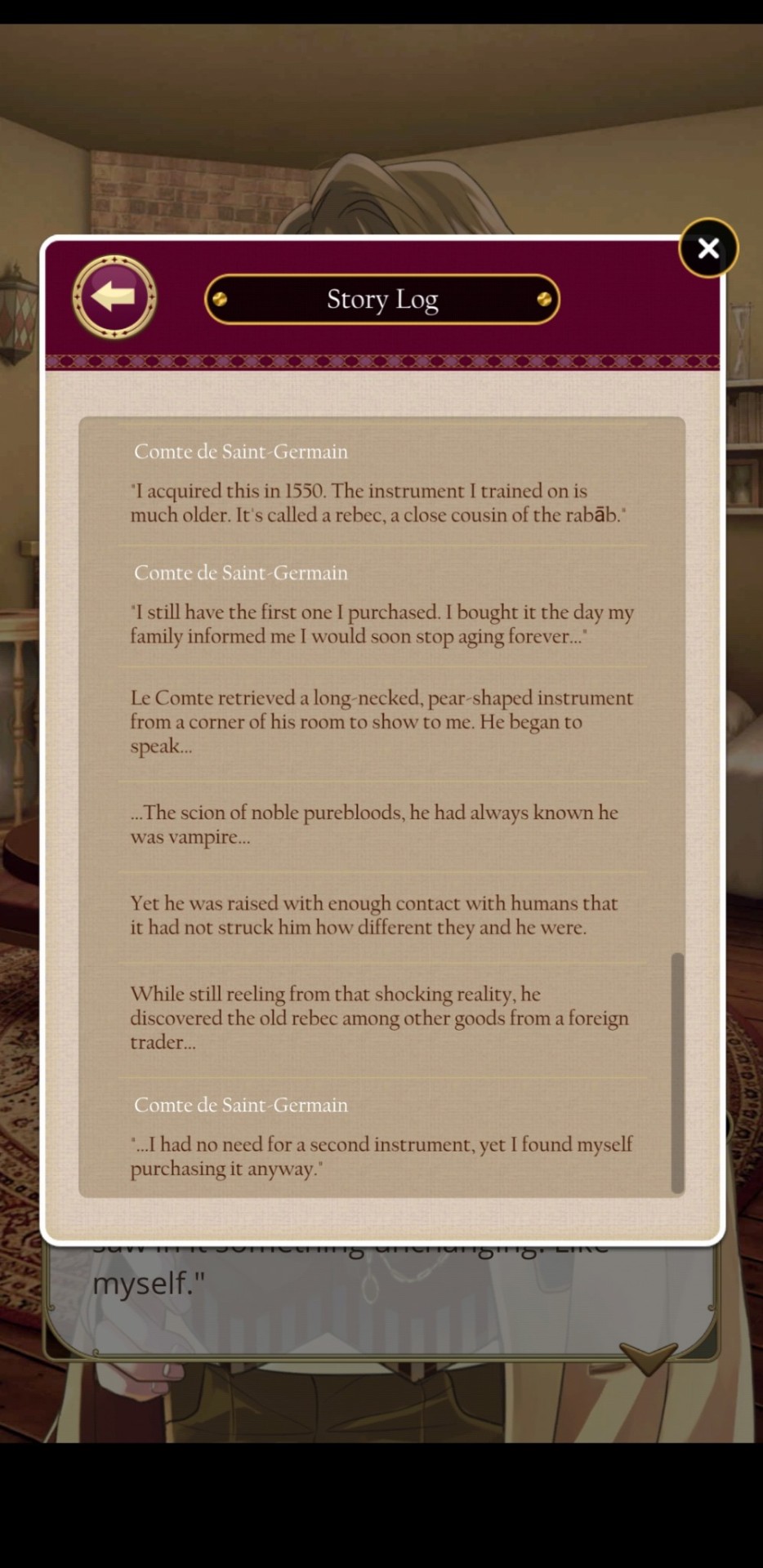
In this story, Comte speaks a little bit about his childhood because MC found him playing the violin. He talks about how he originally trained as a young boy on an instrument called "a rebec." Mind you, Comte says that he still has the first one he ever bought--he remembers because he acquired it the day he was told he would stop aging forever. In due course he takes it out to show her--and later plays for her, at her request.
Now, looking at all the facts. The violin was said to be introduced between 1540 and 1560, roughly speaking (I'm not a historian, this is all based on rudimentary research). This doesn't tell us too much though, as Comte does say the instrument he trained on and first purchased was much older. Many sources show the rebec dating back as early as the 10th century (meaning anywhere from 900-1000) in Spanish courts, a supposed mashup of the Arabic rebab and the Eastern European lira. The clearest written records (the few that exist) begin from the early 12th century and on, though it was at the height of its popularity towards the 15th/16th century.
Aside from the fact that that's fuckin crazy, that would place Comte as being born anywhere from 900-1100 (1200-1500 at the very latest). Now I know what you may be thinking. How the hell does that narrow anything down, Minnie?
Given the cultural implications surrounding the rebec's emergence, the context actually does allow certain tentative conclusions to be drawn. I've seen indications that musical talent with a rebec was considered a big deal as an indicator of wealth/higher status in the earlier years of that time frame. Taking Comte's childhood into account--that he was raised to effuse aristocratic breeding and poise--I think that makes it highly unlikely he was learning when it was most associated with street performers (during the latter portion of my posited time frame). Everything about Comte's family pretty much screams old money (aka wealth they were born into, not curated during the rise of the mercantile class trying to be posers), so I really can't see them raising their son to play commoner music.
Another very telling bit lies in the phrasing of how he found the instrument: "he discovered the old rebec among other goods from a foreign trader." Remember that in the latter end of the time frame, it was so commonplace it could probably be found among local vendors/craftsmen--there would be no need for them to be imported from foreigners. I imagine his family only had access to the instruments in accordance with their social standing; naturally the rich would have their connections, but not just anybody would have the money or means to get their hands on one.
If my beginner's dive isn't too far off the mark, that would make Comte anywhere between approximately 400-1000 years old. I get this hunch that he's probably somewhere in the middle, I just don't know where exactly. I wish I had a better estimation since that's a pretty huge range, but considering the lifespan of the rebec it's hard to tell.
The only great anachronism in all this is the existence of Comte's pocket watch which was gifted to him by his tutor (I believe that's what she was, I know it was one of the human people in his house when he was young). The first pocket watch is said to have been created in Germany in 1510 (and shortly after distributed in Italy), but honestly it feels a bit out of place compared to all of the other evidence available to us. If that's the case, then Comte could have been born in the 1490s (since he received it when he was like 12, somewhere around there). Honestly I do feel the game suggests that he's older than that, so there's some dissonance there. But I leave that up to personal interpretation, since I'm not 100% sure about it either.
Lowkey, I feel like they might have gone so hard with the timepiece imagery for Comte that they forgot the historical practicalities attached to them, so that's half the reason I don't know what to do with this information. I get that vibe of like something something rich people cop out, unless purebloods have weirdly long childhoods--
Leonardo I don't have as many receipts because I'm just a poor Comte stan trying to live (his collection stories are pain), but if we go by the indication that his in-game life loosely follows the historical figure and simply continues on with his faked death, that means he was likely born somewhere around 1452. I can't remember super clearly, but for whatever reason my only memory of age indicators for Leonardo was around 400 or so (which tracks with that interpretation). That would actually make him potentially younger than Comte, younger than I initially anticipated. Or, if Comte was born on the latter end of my estimations, they are at the very least close in age.
Also please don't hesitate to let me know if I'm missing any receipts on Leonardo, I have only one brain cell and she is trying so hard, my friends
As to the place of Comte's birth I haven't the slightest clue about that. It's pretty obvious he's of European ancestry, but as to where he was born/raised exactly, it's difficult to tell. Given all the talk of the rebec there's a decent likelihood he originates from the Mediterranean area/Southern Europe, as it is an Arabic instrument by origin that was adapted into something new by Spain. (This could mean he was born anywhere between France, Spain, Italy, or even the countries a little further up or closer to the Middle East.)
I considered Northern Europe/England, but honestly the evidence doesn't really seem to lean in that direction. Comte mentioned that he once lived in England and made friends there, but the way he talks about makes it sound like he was a visitor/traveler, not a native. And frankly, Comte isn't insufferable enough to be English lmao, he has a conscience. There is actually some tentative evidence for Irish descent, as the vampy mind persuasion/compulsion is termed "geas" in the game, which is a word that stems from Irish gaelic/folklore. The only reason I don't think there's a real connection is that there's no further evidence tying Comte to Ireland; and I don't think the etymology necessarily guarantees ancestry (though there is something to be said about the Irish gothic and vampiric origins).
Admittedly it feels like the game makes his nationality vague on purpose, and I think this has a two-part intention. The first is that historically he was shrouded in a great deal of mystery, so it only makes sense they would be reluctant to name a singular place. The second is that--and I don't remember where the screenshot is, I saw it a while ago--the game describes him as belonging to no one place (that he belonged to all and none). Keeping his character construction in mind, I feel like this aligns with his general theme of contradiction. He's a greater vampire who prefers to keep company among humans, he's a powerful being with a fragile/sensitive heart, he has strong convictions but hesitates constantly, he's able to blend in almost everywhere he goes but never truly feels like he belongs. It would only make sense, narratively speaking, to keep with that motif/trend.
Also quick aside, because I can't help the music nerd in me. Rebecs are bitchin?????? Holy shit slay. Fun fact: they appear to have been primarily used for festivities, played for dancing. That gives a whole new impression to the fact that he bought one the moment he found out he would never age any further. I guess I just think about how that's a pretty joyous purpose for the music (beyond the pedigree aspect). That he clung to this specific artifact as a way to remind himself of his connection to humanity, that it was about people gathering and enjoying each other's company (and yet at the same time, all the political games that come with such leisure)...what a reflection of who he is today. I think it's fascinating how much people are at the heart of his personal motivations and feelings, considering how easy it is for purebloods to become lone wolves (power and secrecy would lend itself to that.) Instead, Comte chooses to hide in plain sight and actively works to stay engaged in the times and among the population. Then again, if I were hundreds of years old I would probably also beg for a distraction from the encroaching madness so like ajkhslgfkjhfslakjh it's very sweet but also mood...
In short:

Thank you for the ask, lovely!! 💛💛💛💛 I hope this answers your question? I love any excuse to talk about my one and only 👀💍
#ikevamp#ikemen vampire#ikevamp comte#ikevamp saint germain#ikevamp leonardo#ikevamp meta#honestly i went down a much deeper rabbit hole than I anticipated#but the game is so vague and my mans so sexy that i just had to see the timeline for myself#in short: i don't need sleep i need a n s w e r s#although man if im reading this all correctly that's insane#that would make him potentially twice as old as leonardo b r U H H H H H#explains comte's sense of like 'im old enough to be too mature for this' (chops the back of Leo's head the second MC isn't looking anyway)#i still die laughing whenever i read comtes second bday story and it deadass says 'but before leo could make a wisecrack'#their verbal jousts to establish class clown dominance are hilarious#i have half a mind to give them wiffle ball bats and watch them smack the shit out of each other#with only that feral instinct that wiffle ball bats evoke in pent up middle schoolers#comte be like 'take the professional deep breath' in every other situation#but then on sight just **decks leonardo with a folding chair**#literally the duality of man#fangdad propaganda#all right all it is 1am it is time for me to sleep#but i hope you enjoyed this installment of minnie's rambles
101 notes
·
View notes
Text
Playing Card Master Infodump
Ok gang, let's talk about playing cards again.
I’m going to try and get through this as systematically as possible but I will inevitably end up repeating myself due to the interconnected nature of the whole thing. Also I’ll try putting in subheadings to make it more readable. Let’s crack on!
Mameluk Playing Cards
I mentioned in my first post that European playing cards are based on ones from Mameluk Egypt, so let’s see if we can find some historical examples.

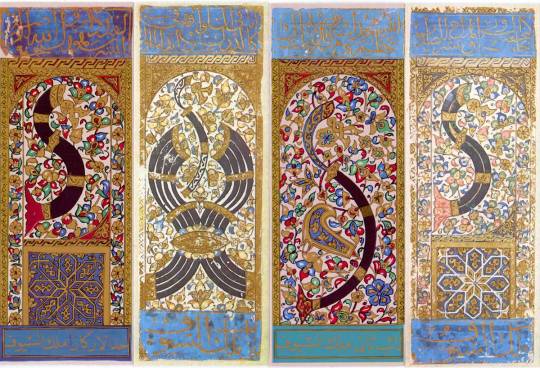
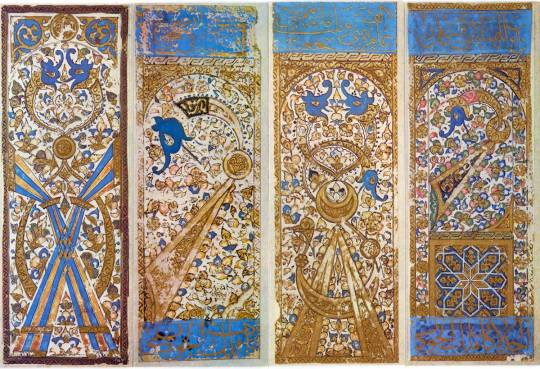

From the Topkapu Sarayi Museum in Istanbul, an amazingly preserved set of Mameluk playing cards depicting the four suits
These cards are a perfect starting point. Dating from the 15th or 16th century, we’ll be seeing their influence percolate throughout playing card design throughout Europe. Here we see the suits that will directly influence Spanish and Italian playing cards: coins, cups, swords, and polo batons (a common sport of the ruling class). The court cards are King-Lieutenant-Second Lieutenant, the deck would’ve contained 52 cards (1-10 plus three court cards), and the illustrations are rich in detail and heavy with Islamic calligraphy. We will be tracing the evolution of European cards back to these ones as we go along, so it’s important to have an example of where it all started.
Spanish Patterns
The Islamic influence in southern Spain makes it the perfect entry point for playing cards to arrive in European material culture around the late 14th century. Spanish patterns follow the same suits as Mameluk ones (coins, cups, swords, and staffs), but a deck would contain only 48 cards, numbers 1-9 and three court cards. The court cards follow the Mameluk rankings but with a European twist, making it King-Knight-Page. Swords in Spanish cards are depicted straight, as opposed to Italian swords which are curved.

Old Catalan / Spanish National Pattern, modern day
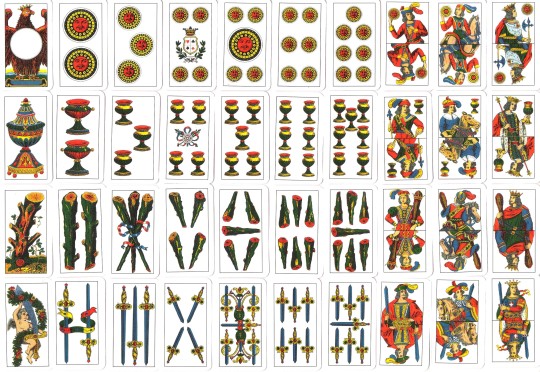
Piacentine Pattern, found in Italy in Bourbon ruled Piacenza, shows remarked Spanish influence yet is the only Spanish pattern regularly sold today to feature reversible court cards
Some syncretism would occur with the intermediary Franco-Spanish pattern, as Spanish cards would arrive in France prior to the establishment of the French standard patterns. The use of Spanish suited cards continues in areas such as Brittany and the Vendee through the game of Aluette, however the original Franco-Spanish pattern is now extinct. These decks would also consist of 48 cards: 1-9 and three court cards, King-Knight-Page (Roi-Cavalier-Valet). The use of these patterns would directly influence French patterns to come
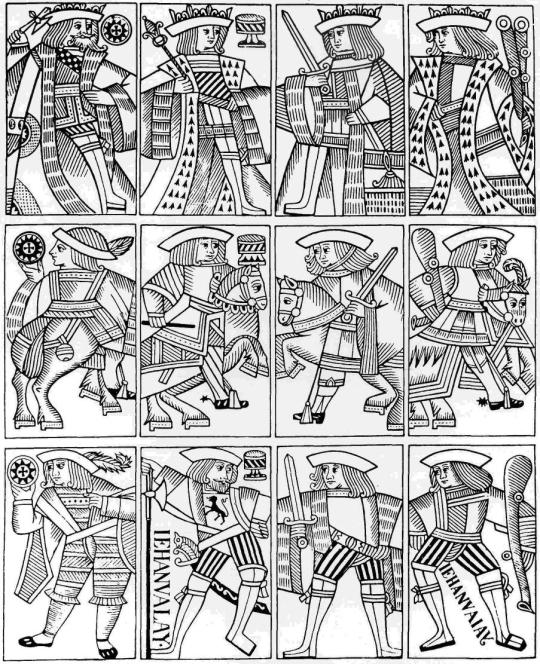
The court cards in the Franco-Spanish pattern showing Spanish suits
French Patterns
French patterns would begin with Spanish ones around the 14th Century, and would mesh with Germanic ones to produce something we would start to recognise as the Anglo-American pattern. The French suits (Hearts, Clovers (Clubs), Tiles (Diamonds), and Pikes (Spades)) are based on the Germanic suits (Hearts, Acorns, Bells, and Leaves respectively), however for a brief period a suit of Crescents was used instead of Tiles.
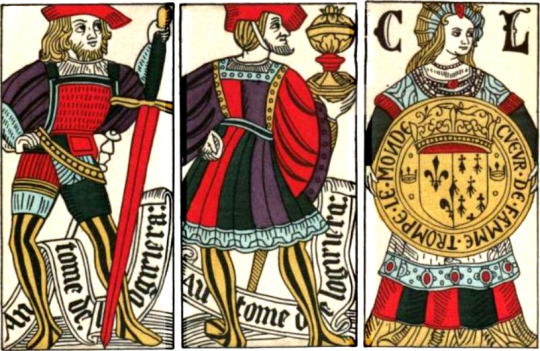
Cards celebrating the union of the kingdoms of Britanny and France, 1500, show the Spanish suits
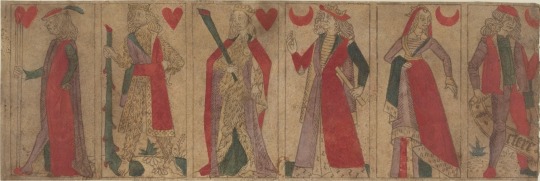
An example of the short-lived Crescents suit, Lyon, late 15th century
The majority of Italian, Spanish, and Germanic patterns follow the Mameluk tradition of all male court cards, which causes French patterns to stand out with the inclusion of Queens in place of the Knights. Queens had appeared in decks in both Italy and Germany in the 15th century, but had mostly been dropped in non-tarot decks. The inclusion of Queens, however, continued in France where their inclusion replaced the Cavalier (Knight) with the Dame (Queen). The naming convention of Dame for Queen will also be seen in Germanic patterns.
The Paris pattern, as distinct from Anglo-American or Hamburg patterns (about which more anon), is unique in that each of the court cards reference a historical or biblical figure, and are so named even to this day in the portrait officiel pattern (a deck of 32 cards, however sometimes printed in 52-card deck variants). As an example, the Kings of the Paris pattern refer to Charlemagne (Hearts), Alexander the Great (Clovers), Julius Caesar (Tiles), and King David (Pikes). The use of Julius Caesar as the historical figure associated with the King of Tiles, and most known in the past by his depiction on Roman coins in profile, might explain why in the later Anglo-American pattern the King of Diamonds is the only King to be depicted standing in profile.
Belgian pattern cards are similar to Paris (portrait officiel) decks and likewise come in 32-card and 52 card variants.
Germanic patterns
The closest pattern to connect Germanic decks to French ones is the Hamburg pattern, which would directly influence the North German or Berlin pattern. Taking the suits that we know today (hearts, clubs, diamonds, spades) and beginning production in the early 19th century, a clear link to the Paris (portraits officiel) pattern is shown in the depiction of the King of Spades holding the Harp of King David, a reference to the association of King David with the suit of Pikes (Spades) in the Paris pattern, and the laurel wreath under the crown of the King of Diamonds (Julius Caesar, King of Tiles). Germanic patterns closely associated with the French patterns name the court cards as King-Lady-Farmer (König-Dame-Bauer)
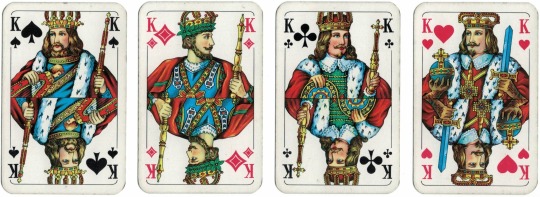
The Kings from the North German pattern showing links to the Paris (portrait officiel) pattern conventions
Germanic pattern playing cards, however also predate the suits used in French patterns and had a direct influence on them. The Germanic suits of Hearts, Acorns, Bells, and Leaves became standard around 1450, where upon it would directly influence the French suits and finally the modern Anglo-American system of Hearts, Clubs, Diamonds, and Spades. Many packs using this system contain only 32 or 36 cards, as is appropriate for the kinds of games played in the areas where they are common, and the court cards are typical established as King-Over-Under (König-Ober Knabe-Unter Knabe) in the Mameluk style of a leader and two ranks of soldier. The Ace in Germanic suits is really, and was referred to in the past as, a Deuce (Daus in German), which is why the Ace in these decks, the highest card in many regional games, actually exhibits two suit symbols rather than one. In the William Tell pattern deck, the four Deuces represent the four seasons of the year, however this is not typical across Germanic decks, which typically depicted a boar or sow in older decks, a tradition that continues today only on the Deuce of Bells.
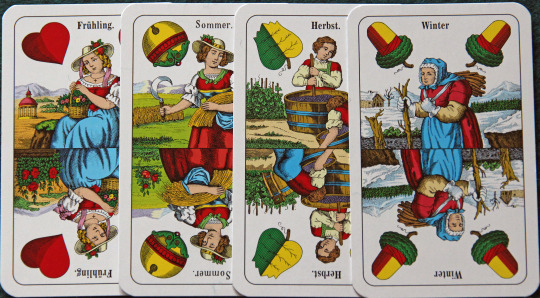
The Deuces (Daus) of Germanic decks
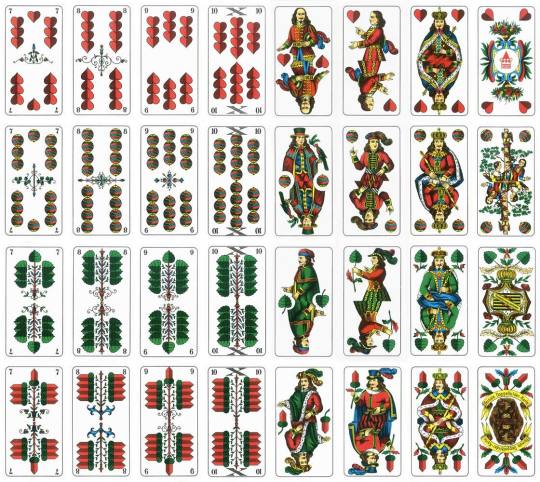
Saxon pattern

Polish-Silesian pattern for the game of Skat

Altenburg Doppelkopf pattern, exhibiting the North German pattern court cards of König-Dame-Bauer with the Germanic suits

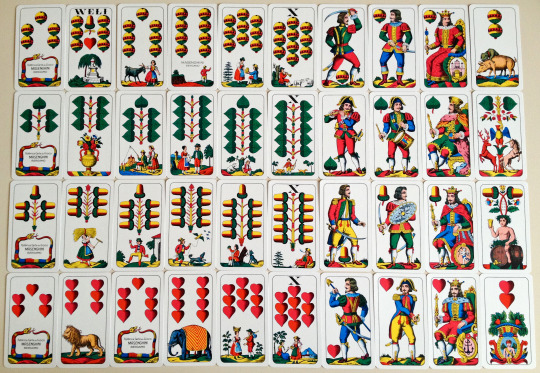
Salzburg pattern showing non-reversible court cards typical of earlier patterns, and Franconian pattern showing reversible ones, typical of later patterns
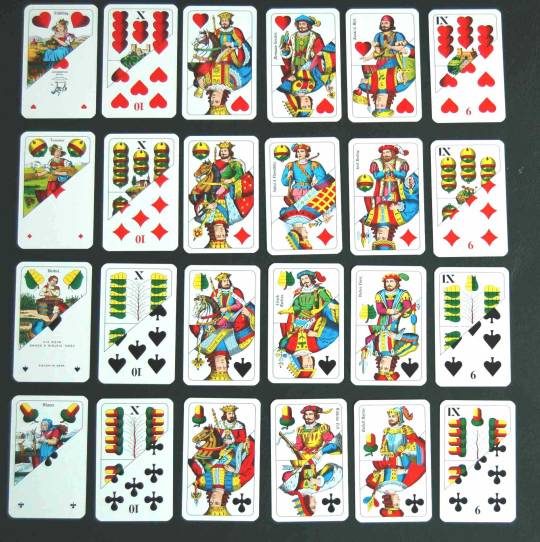
A hybrid deck showing both Germanic and French suits, in this instance the Germanic pattern is listed as William Tell and the French as Viennese
Italian patterns
Italian patterns closely resemble Mameluk and Spanish patterns, and it is in Italy where the polo baton of the Mameluk deck was replaced with a staff, or baton or club, for an area where polo was not well known or played.
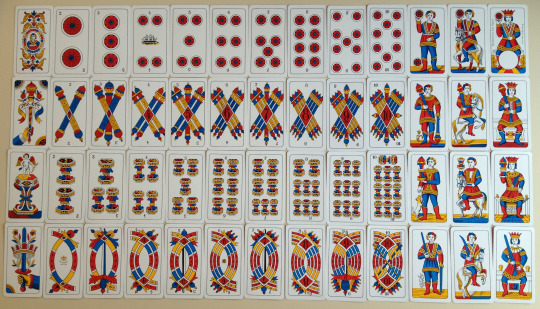
Trentine pattern, showing the Mameluk influence in both suits and court cards (King-Knight-Page)
In South Tyrol, a region acquired by Italy at the First World War, the Germanic Salzburg pattern is still used with Italian translations known as the Salisburghesi pattern.
It was in Italy that the first tarot decks were produced, where additional ‚trumps‘, known in Italian as trinofi, were added for more advanced card games. Typical to Northern Italy in the Italian suits, tarot cards for games such as Tarrochi, Tarock, and Scarto spread to France and Germanic areas whereupon there was further alterations made.
Tarot patterns
Tarot cards were never originally intended for Cartomancy, such associations came later in the 18th and 19th centuries, however there is a distinct split between Franco-Italian patterns and Germanic ones. A rare Italian deck serving as a progenitor of sorts to later 78-card tarot decks that now lost, was described in a letter from Milan in 1449 and supposedly consisted of a deck of 60 cards with only the four Kings as court cards, sixteen trump cards, and the suits as birds rather than any surviving system. Early 78-card decks replaced the court cards with classical figures and made the trump cards those of classical deities. Many of these early decks survive only as incomplete examples, damaged printing sheets, or in descriptions alone.
The Tarot of Marseilles is likely the first 78-card tarot deck to resemble the one we know today. The suits follow the Italian and Spanish patterns, synthesises the French and Spanish-Italian-Mameluk courts cards to give four in each suit: King-Queen-Knight-Page. The Major Arcana, or the trumps when ranked by value, are similar to modern tarot decks, albeit with some notable differences: the Magician is replaced by Le Bateleur (The Juggler), the High Priestess by Le Pances (The Popess, likely a reference to the myth of Pope Joan), and the Hierophant with Le Pape (The Pope). In Swiss tarot decks, the High Priestess is replaced by the classical deity Juno, and the Hierophant with Jupiter, in the style of the older historical Tarot de Besançon pattern.
Germanic tarot cards, however, are entirely different in nature. Trump cards in the Bourgeois Tarot pattern, with its sub-pattern the Tarot Nouveau, depict scenes rather than figures, and are split into groups of four (such as the times of day and the four elements), with the final three depicting Games (trump 20), the Collective (trump 21), and the Individual (trump 1)

Example Tarot Nouveau trumps, reversible but each scene depicting the card’s meaning

The trumps of the Industrie und Glück pattern, a standard tarot deck for games in the Germanic regions that uses the French suit system for value and court cards
One variation of tarot decks, known as Animal Tarot patterns, uses both real and fictional animals for the trump cards, and continues today only in the south German Adler Cego pattern
The End?
Honestly, this is all I have energy for at the moment, but I wanted to show just a hint of the huge variety of different playing card designs throughout the centuries and their effect on the modern decks of today. There is so much more I’d like to get into, so if you have some questions please please please ask!
36 notes
·
View notes
Text
Introduction post!
Basics
Hi!!!
My name is Kesar (or any other variant of the name Caesar is fine to call me!) and I am 14. I am neurodivergent. I am an Asian-European (India and Sweden!), Hindu, and my pronouns are he/they!
Interests and Likes
I have a hyperfixation/special interest (I don't know which to use because I'm in denial about being autistic LMAO) of the Mediterranean, mostly Italy and Spain but also France, Portugal, Egypt, Greece, etc!
Languages
Due to my interest, I have taught myself Italian all on my own and I study Spanish at school since 2020, so I can speak them both at a good level.
All of the languages I speak as well as some more info on my history with them:
Swedish, I speak it every day and a bit at home
Hindi, I speak it every day at home with my family, it's the language I have grown up with mostly.
English, I speak it here and I consume a lot of English media. Also I went to an international school for a couple of years.
Spanish, I've been learning it at school. Ever since I started learning it I've been the best in the class (this is very much a flex, I am very proud of the fact). I speak it at a very good level but I'm not close to fluent.
Italian, I am very proud of that I speak it because I learnt it all on my own using primarily music. I started learning it in 2021 but then took a LONG break for almost 2 years and in 2023 I got back on track and learnt it so well I'm almost at the same level at it as I am at Spanish hahaha
French, as I speak Spanish and Italian it wasn't that hard for me to get a grasp at French. I'm definitely not good at it and am best at written French, not spoken, but I understand enough to say I know it. Also, I can carry a conversation in French so. Yeah. I also really like Lupin.
Urdu, as I speak Hindi I understand Urdu well. Of course there are words I don't know, but since I understand so much of it and I speak it better than I speak Spanish or Italian I had to include it.
Music
My favourite song artists are Marco Mengoni and MIKA. They are my top 2. I love them so much.
I also listen to Mahmood, Måneskin, Queen, The Lonely Island, Lady Gaga, Kali Uchis, Megan Thee Stallion, Veronica Maggio, Shreya Ghoshal, and a lot more.
Apart from that I like English music from 2000 to the late 2010s. I also like Hindi music, rap (i listen to a LOT of Megan Thee Stallion, she's such a queen), Eurovision (although I am not supporting them this year due to them including Israel, Free Palestine🇵🇸), Hispanic music, Francophone music, Italian music and Swedish music. I also enjoy classical, both South Asian and European.
TV
I love TV! My favourites are dramedies. I like comedy a lot. My favourite type of show would be sitcoms because I understand them and I grew up with them and I like their humour. Here are TV shows I very, very strongly like in no particular order:
Brooklyn Nine Nine, Community, 1899, Mythic Quest, Lupin, Monk, and probably more that I just don't remember right now.
I have also watched a lot of other things, but this is all that comes to mind.
There are films that I really like, and most of them I have watched more than a few times. Like there were literally periods when I would just keep rewatching these:
The Kung Fu Panda film series, The Hotel Transylvania film series, The Lorax (specifically the Italian dub), The Shrek film series, and once again probably many more.
Other stuff I like:
Doraemon, Spider-Man: Into The Spiderverse & Across The Spiderverse, Shubh Mangal Zyada Saavdhaan (2020), Smiley (2022), Saiki K (TV series, I haven't been able to read the manga :/), etc.
Books
Mostly I read fact books, in middle school the librarian hated me for (metaphorically) eating up all the books on ancient Egypt, but I also have a few books I really like!
I love Rick Riordan. My favourite from him is definitely The Kane Chronicles but I also like PJO. I'm TKC all the way, though.
I also like Geronimo & Thea Stilton as well as Diary of a Wimpy Kid. They give me comfort.
I have a lot of queer books I bought for the sole reason of them being queer but I haven't read them yet hahahaha. I'm almost finished with Friday I'm In Love by Camryn Garrett!
Playlist time!
My Marco Mengoni playlist:
My Brad Bakshi playlist:
My Trobed playlist:
My Braddavid playlist:
That is all I can really come up with right now, but I will probably edit this soon! I'm not very good at stating what I like and all of that because I'm always scared I'm not telling everything or that people won't understand how I like it and stuff LMAO so don't be surprised if I take this post down :( I'm trying to get better though, so I'll keep it up!
16 notes
·
View notes
Note
Could you please talk more about how/why agreement systems develop in language? I always feel that agreement systems are poorly justified in my conlanging
Agreement systems are retained in language because the redundancy strengthens the signal. It's better to think about linguistics systems in terms of "why didn't speakers get rid of this" as opposed to "why did this come about in the first place". Sometimes things happen randomly. They're retained because they're useful.
But like, consider gender in English. We used to have it. Gender was mostly defined by the endings of words. We lost all the endings. We lost some major forms of agreement (consider that French still has different articles). At a certain point, it was impossible to tell if a noun was m/f/n, so of course English lost its gender system. It was no longer useful. In fact, going even further, it was the opposite of useful, because it was totally unpredictable and didn't buy you anything.
As an example of the latter, there's this sign system called Signed Exact English (SEE). It's often (not always, but often) pedaled as a replacement for ASL, because it will "help" Deaf signers learn English. One of the features it retains is the distinction between "a" and "an". English speakers know how to do this instinctively: You use "a" before a noun phrase (not a noun, but a noun phrase) that begins with a consonant sound, and you use "an" before a noun phrase that begins with a vowel sound (so "umbrella" gets "an", but "union" gets "a"). In SEE, there's a separate sign for "a" and "an", and then ASL signs are used for English words like "man" and "old". So then you have to sign:
A MAN
AN OLD MAN
But, of course, the difference is based on the sound of the English pronunciation of the word the sign stands for, so it is quite literally impossible to predict for a Deaf signer. It has to be memorized. Which is an extraordinary task. Basically, all nouns, adjectives, and adverbs (consider "a really old man") have to be dumped in either the A class or the AN class with absolutely no way to predict which will be in which.
This is a great example of a feature that would quickly die in a natural language.
So looking at gender, the question is how useful is it? If it's (a) predictable, and (b) spread across multiple areas of the language, then it's more useful, and more likely to be retained. If you look at Spanish, agreement is present in pronouns, adjectives, demonstratives, and articles. The gender of a noun highly predictable (not 100%, but highly predictable). That's a stable gender system. French is similar, but the gender is less predictable for nouns. If one was going to lose gender first, you'd predict French. Even so, it's still predictable enough that more will probably have to happen for French to actually lose it.
As for where it comes from, if you want to read a detailed account of the development of Indo-European gender, this is an intro. Most of the time it's the incorporation of pronouns or small, generic nouns that become commonly associated with particular classes and are used as modifiers. We've got a pretty good example of the development of noun class in Sarkezhe, season 4 of LangTime Studio. If you want to see it done from beginning to end, check that out.
Hope that helps!
#conlang#language#gender#development of gender#grammatical gender#noun class#linguistics#pie#indo-european#asl#see#signed exact english#spanish#french#sarkezhe#lts#langtime#langtime studio#sign language
146 notes
·
View notes